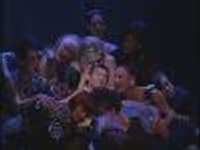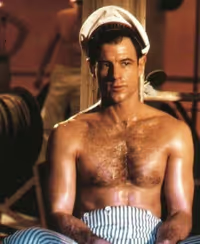Making It On Broadway - th truth?
NYC20042
Understudy Joined: 6/23/04
#50The Book: Making it on Broadway
Posted: 11/8/04 at 10:52am
Here is a question:
Who here thinks it's a problem that Broadway actors are often more concerned about trying to make each other laugh on stage than entertaining the audience?
Why don't directors re-visit long running shows as often as they should?
How about the peer pressure on Broadway NOT to act?
How about the sexual harassment which goes unchecked?
These are the issues we should be discussing here.
Thoughts?
Updated On: 11/8/04 at 10:52 AM
#51The Book: Making it on Broadway
Posted: 11/8/04 at 10:55am
Now those are all valid issues.
I do think the sexual harassment is addressed when it's reported nowadays - I know of one producer who was banned from going to the dressing room floors of his own show last year. Things are looking up in that area, at least.
sean martin
Broadway Star Joined: 7/4/04
#52The Book: Making it on Broadway
Posted: 11/8/04 at 12:21pm
>> Theatre friendly academics? Are you serious? They're a myth
Uhm, speaking as one who's about to start a teaching position with a college in North Carolina that's well known for its theatre department, I'd hazard that you're wrong, but anyway... :)
>> Why don't directors re-visit long running shows as often as they should?
If they're good, they're probably off working on their next assignment. If they're not, they probably dont want to be reminded of how much they messed up and how much their work is now dependent on good (or marketable) performers.
>> How about the sexual harassment which goes unchecked?
Hey, if it was just in the theatre profession, it might be a legitimate question. But I can assure you that what goes on on the casting couch is a reflection of what goes on on the corporate couch as well. I know that's not an answer, but it is a reality.
#53The Book: Making it on Broadway
Posted: 11/8/04 at 6:28pm
OK, after all of this hullabaloo, here is my issue, likes and dislikes, with the book:
Likes:
A) Loved that there was total and complete truth 75% of the time
B) Loved how diverse the group of people they spoke to were. (From chorus in a bus and truck to leads on broadway)
Dislikes:
A)One thing I remember being said that had me FUMING, cause its NOT true, is one of the final quotes from Marissa Jaret Winokur.
she says something to the effect of "It will be just as hard for me to get my next broadway job as it was for me to get HAIRSPRAY" BULLSH*T! She, by her own admission, had to fight very hard to get SEEN for Hairspray, and I find it impossible to believe that if a role came along that suite her well, she would have a hard time getting SEEN for it. For example, if there was a revival of "Mattress" that came along tomorrow, Iwould have a hard time believing that if she really wanted an APPOINTMENT to audition, that they would not give it to her. If she wanted to be seen, she would be. So thats one step closer than she was before. Granted she may still have to work really hard and fight and campaign for the role, but is it really as big of a longshot as Hairspray was in the beginning? NO. I sincerely doubt it. 20 years down the road, I could understand this complaint. But 1 YEAR after she headlined in a new hit musical and won a Tony? no. She would more than likely be seen.
B)On a similar note, if a revival of "South Pacific" were to pop up, do you honestly think Sutton would have a hard time being SEEN for it should she so desire? NO
C) As for Jodie Langel, who told the story of assuming that she would get Betty in the SUNSET BLVD. tour after doing a role in LES MIS on tour? That was a stupid assumption on her part. But she wasn't a RECENT (keyword: recent) TONY winner.
Look, I know everyones success has a half-life. Would a guy who was in the chorus of a broadway show 10 years ago have any real leg up. no. But the point is, if you are a known quantity, it won't ensure success, but it damn well HELPS.
Just a story to truly illustrate what I am talking about: After Laura Benanti made a splash in SOUND OF MUSIC and later TIME AND AGAIN and SWING. She was the HOTTEST new girl in town for a good year. Now4 of course that "lust" that people MUST have Laura in their show has died down, but she is still working.
Another case in point: Emily Skinner. True she hasn't had as big a success since SIDE SHOW. but do you honestly think without it it would have been just as easy getting THE DEAD and THE FULL MONTY and then DINNER AT EIGHT and then ON THE RECORD
Thanks for sticking with me-
Doug
sean martin
Broadway Star Joined: 7/4/04
#54The Book: Making it on Broadway
Posted: 11/8/04 at 6:36pm
>> But 1 YEAR after she headlined in a new hit musical and won a Tony? no.
Well, yes, actually.
#55The Book: Making it on Broadway
Posted: 11/8/04 at 6:47pmOK, I'm NOT saying that she would have a good shot at a role, but if there was a role she was right for, who do you think would have a better shot at getting Seen: "Hi, I'm blah blah blah Tony Winners agent from 2003. My client would like to audition" Or, a mass mailing from a girl who did a commercial for slimfast? (Not that Winokur has, but I'm just saying...)
#56The Book: Making it on Broadway
Posted: 11/8/04 at 7:01pmElizabeth Marvel is one of the most sought-after off-Broadway actresses around right now. Her fee for doing HEDDA GABLER? $600 a week.
#57The Book: Making it on Broadway
Posted: 11/8/04 at 7:07pmThat's not a large amount of money...
B.B. Wolf
Broadway Legend Joined: 7/26/04
#58The Book: Making it on Broadway
Posted: 11/8/04 at 8:02pm
I'll answer your questions, NYC20042, with a mix of my opinions and the opinions of a few other actors:
1: Yup, it's a big problem. I have no patience for it. UNLESS, it feels part and parcel to the makeup of the show. Kristen trying to make Idina laugh in Popular feels perfectly fine. Javert pinching butts and playing tag behind the barricade does not.
2: Directors are mercenaries. Rarely do they feel too much of a personal investment in the shows that they've directed beyond the reviews. In my experience anyway. I think Phantom has four directors, currently, if anyone's interested in that lil tidbit.
3: I've HEARD of this, but never experienced it. I think it may be perceived, but not actual.
4: Most of the actors that I know believe that sexual harassment doesn't exist on Broadway or the greater theatrical world. Not that is doesn't happen, it's just not much of an issue. Sounds naive, doesn't it? It is. And, speaking as a man who's taken, let me just say that it swings BOTH ways, ladies. Respect the ring, please.
Two cents, tossed. ![]()
#59The Book: Making it on Broadway
Posted: 11/8/04 at 11:29pm
Here are my sentiments on "Making It on Broadway". I posted this way back on July 24th, after I read the book (yay for Yahoo cache!).
--------------------------------------------------
I finally read Making It on Broadway, and although I found it an engrossing and enjoyable read, I did have some issues with it. I admired how the entire book is made up of first-hand anecdotes and quotations from Broadway performers, and the writers do try to be as objective as possible - however I couldn't help but feel I was still being manipulated. Some thoughts:
- The chapters seemed almost purposely slanted towards the negative. I know life on Broadway is hard, but I felt they were really hitting me over the head with it. Even the "hopeful" or joyful sections of the book all begin with a chapter blurb that says something to the tune of, these are the happy moments of Broadway, but they are far and inbetween. Take these quotations as exceptions in a life of disappointment.
- I felt there was a vein of xenophobia in the book, as if the mega-musical was solely a British invention, a type of British invasion of Broadway. But there was little discussion of the Broadway community's own role in the commercialization of the scene. The book singles out Disney and Cameron Mackintosh as sole catalysts of this, but I think it would have been more accurate to also examine how Broadway producers were moving in this direction anyway; it didn't happen overnight, and there was evidence of it happening way before Cats opened.
- While the book tries its best to cover a wide range of shows and periods, there was still definitely skewed representation. While some mega-musicals like Cats and Les Miserables were covered at length (particularly Les Miserables - in the manner it was discussed, I felt like the writers had some kind of vendetta against the show or something), others were either ignored or only briefly mentioned. A show that was suspiciously absent was Phantom, the quintessential bastion of the mega-musical. Considering how much discussion of the modern-day mega-musical there was, I was surprised Phantom didn't feature much in the book. Another glaring example is Rent; the show was and remains a prominent iconic musical of contemporary Broadway, yet I believe the only performer interviewed was Wilson Jermaine Heredia, who didn't talk about the show at all. (There was more material on Martin Guerre, a musical which never made it to Broadway, than there was of these two "overlooked" shows combined.)
- The issue of sexuality backstage also felt incomplete. There was discussion on how most men in musical theatre are homosexual, yet there were very few quotations from gay men talking about their experiences. Instead, we were treated with a plethora of anecdotes about what it was like being a straight man in musical theatre.
- With an entire section on sex in theatre, I felt they could have also explored a more pertinent issue on Broadway, that being racial casting. The only quotation that touched on that was one by Lea Salonga; but it's something was pretty much ignored in the book, to my surprise.
- I felt the writers were "pushing" their message a little too much, to the point when it became an agenda. The book's conclusion, for instance, seems more like a strongly motivated incitement to action - a kind of, "this is why Broadway is suffering, this is why it's bad, and this is what you should do about it." It felt a bit condescending and rather contentious.
- On a lighter note, Jason Alexander was annoying, but his foreward was good.
Any thoughts, disagreements, debates?
#60The Book: Making it on Broadway
Posted: 11/9/04 at 5:27am
After reading that book, I just realized that there are a lot of winy, moaning,complaining actors out there.
A 8 Show a week schedule is just dicipline! I know it is hard to keep it alive when you do every night the same thing. But I am sure everyone knew before they signed the contract, that it is gonna be 8 shows a week.
What annoyed me the most was, that people complain about not being creative enough! But when they have the chance to be creative, it is like teaching a child in a wheelchair to walk!!
I think a lot of actors just don't know what they want. Or always looking for an excuse.
I personally rather have somebody telling me where to go and what to do. I mean as an actor, my job is to learn the lines and show up on time. Their job is to tell me where to go and what to do. I hate it when creative people come into an rehearsal unprepared and waste 3 hours just because they can't decide which side the actor should enter.
But that's just my opinion!
Speed
Broadway Star Joined: 7/12/03
#61The Book: Making it on Broadway
Posted: 11/9/04 at 8:50am
Doug-
What Marissa is saying is sad but TRUE.
Actually, being a KNOWN QUANTITY can make it very HARD to get seen for things. After all.... they KNOW you or THINK they know you. I could absolutely see them saying "Oh yes, we love Marissa but we're not going that direction for Mattress" and well, that's it. She doesn't get seen. Same could happen with Sutton. They could be "Oh, this director knows Sutton and wants to go in a different direction."
The more KNOWN you are, the less necessary it is to see you. Different casting directors and different directors have different opinions of what is good. Some might like you, some might not. You might have won the Tony, but Joe Director might have pullin' for your competition. And your Tony isn't necessarily gonna sell tickets so....see what I'm saying?
PLUS- Showbusiness is all about new faces. Broadway doesn't want to cast the same person over and over.
As for Emily Skinner... you know why she gets all those jobs?? Cuz she's THAT talented. I don't think those directors cast her because "she was in SIDESHOW so she must be good." They cast her because she goes into the room and is the best for the part.
Speed
Broadway Star Joined: 7/12/03
#62The Book: Making it on Broadway
Posted: 11/9/04 at 9:20amI agree with "a lot of actors just don't know what they want." So true.
#63The Book: Making it on Broadway
Posted: 11/9/04 at 9:28amI think they hear all the stories and still believe "That won't happen to me."
Speed
Broadway Star Joined: 7/12/03
#64The Book: Making it on Broadway
Posted: 11/9/04 at 9:37amOr they hear all the stories and think "I WANT that to happen to me" and have no idea what they're getting into...
NYC20042
Understudy Joined: 6/23/04
#65The Book: Making it on Broadway
Posted: 11/9/04 at 12:18pm
One more thought:
Why is it that anytime actors explain what their life is really like, they are accused and belittled for "complaining?"
I find it so unfortunate, and perhaps tragic, that so many people who have posted messages here celebrate the broadway performer but refuse to recognize them as people and provide them with any understanding.
Perhaps so many of you are too afraid to let go of you childhood dreams of theater and embrace how Broadway has changed and how the lives of your favorite stars are not as wonderful as you once imagined...
The book is about real people, sharing their real thoughts, fears, dreams, and sometimes, disapointments. They have been brave to share them with us.
Of course, we can disagree with their perspectives and conclusions, but we should always be respectful.
I find it sad that some people here have lost sight of that.
broadwayguy2
Broadway Legend Joined: 5/18/03
BlueEyedKate
Understudy Joined: 10/26/04
#67The Book: Making it on Broadway
Posted: 11/9/04 at 12:49pm
I haven't read the book; maybe I'll get a chance when I'm not busting my butt through three thesis statements.
But just my two cents on something a few things:
- All authors, all directors, all producers, all playwrights have agendas. They may be conscious, subconscious, incredibly subtle, incredibly director; but anyone who seeks to produce something tangible has a set aim in mind. Sometimes, the aim can be blatantly obvious, but there is a reason why these stories were included as opposed to other ones. Writing a book is a selective process, and stories are chosen based on their ability to communicate the aim of the writers.
- "But there is always an assumption that, if you do "make it," win the Tony, and wind up on posters above the beds of adoring fans like yourself, then life will be easier and different"
To be completely honest, this is an assumption made about any profession in America. We, as a society, have this tremendous propensity to assume that grass is always greener on the other side, to steal a cliche. We are constantly striving to be better, to be richer, to get another title or another award...and then, we equate achieving those goals with being happier and having life be supposedly easier. To those not involved in the theater world as a profession, how many times have you asked if a promotion would make your life easier, and then realized that it came with its own baggage (i.e., much longer hours, more responsibilities, etc., etc.). While winning a Tony may be the pinnacle of success in the theater industry, like any other industry, it does not equal permanence of work, ease of life, or anything else. We often sacrifice realism in the illusion of dreams.
#68The Book: Making it on Broadway
Posted: 11/9/04 at 12:57pmNYC, I don't know why I continue to feel the need to respond to you, but again, please look at my earlier posts. I worked in that business for more than a decade. I am not talking about "childhood dreams" but of the realities I saw. What they complain about are things that they knew going in for the most part, i.e., working evenings and weekends, etc., as well as complaining about jobs where they are paid well to sing, dance and act. And yes, they are complaining. As for respect? I have much more respect for people who are janitors, teachers, doctors, nurses, and fast food workers than for actors who are working on Broadway and finding things to be negative about.
#69The Book: Making it on Broadway
Posted: 11/9/04 at 1:34pmExactly. The reason we scorn any whining from Broadway actors is because it's generally about aspects of the job for which they are handsomely compensated. Julia Roberts once said "I don't get paid a lot of money for doing what I do. I get paid a lot of money to deal with all the crap that comes with doing what I do." If they're going to speak out about valid concerns in a sensible way, that's one thing. But to moan they're working long hours when they earn more in a week than a lot of people do in a month is a little hard to take.
B.B. Wolf
Broadway Legend Joined: 7/26/04
#70The Book: Making it on Broadway
Posted: 11/9/04 at 1:49pm
The point of the book is that Broadway has changed. Not how "hard" the business is. How many times have you(this is the universal "you") gotten into a complaining fight with a friend or significant other? My job is harder and thus I am more deserving of your pity. No my job is harder! It's just a human thing to do. And bear in mind, a lot of people who are drawn to theatre as a profession are naturally dramatic people. As in, they are just as dramatic in real life as they are on stage. OF COURSE, they're going to complain. They're dramatic people!! That is not the point of the book. I think what happened was people who aren't as recognized as they wished suddenly found themselves being interviewed and the opportunity to vent was simply too tempting. Again, the fact that actors can often be petulant and/or whiny was NOT the point of the book. See through the people's flaws, and find the truth and facts in what they're saying: Broadway has changed. Two cents, tossed. ![]()
NYC20042
Understudy Joined: 6/23/04
#71The Book: Making it on Broadway
Posted: 11/9/04 at 3:00pm
Making It on Broadway is a book which illicits very strong emotions. One "group" of people who hate it are the stuggling actors who never made it Broadway, and feel that any actor who is on Broadway should shut-up, keep quiet, act and sing on stage, but never be heard.
Raithnait captures this sentiment perfectly, when he/she writes:
"I have much more respect for people who are janitors, teachers, doctors, nurses, and fast food workers than for actors who are working on Broadway and finding things to be negative about."
Such thinking is both dangerous to the profession of acting and to all those who have dedicated their lives to it. For the first time, the Broadway community has come together, uncensored, and shared their innermost thoughts with the public.
They should never be censored, especially not by actors who fail to "make it" to broadway and think that all those who have should be denied the ability to express themselves as individuals and human beings.
Updated On: 11/9/04 at 03:00 PM
B.B. Wolf
Broadway Legend Joined: 7/26/04
#72The Book: Making it on Broadway
Posted: 11/9/04 at 3:08pm
Oy. I'm staying out of this one.
*quietly leaves room on tip-toes*
Plum
Broadway Legend Joined: 3/4/04
#73The Book: Making it on Broadway
Posted: 11/9/04 at 3:08pm
Express yourself? Since when does expressing yourself mean complaining?
We need a little perspective here, folks. Whining is annoying no matter what professional group is comes from. I'm willing to listen and to be understanding- and I really think the book tilted things way too much towards whining in a way the interviewees didn't intend- but come on. Don't talk to me about the woes of anyone who gets to do what they love for a living. They can complain, but don't tell me that's all there is to it. That's why the book bugged me.
#74The Book: Making it on Broadway
Posted: 11/9/04 at 3:10pmNYC, I am not a professional actor. Nor did I try to be. You are so caught up in your own agenda that you are not hearing anything that anyone else has to say. I hereby give up, as I should have done when I realized it was futile to have a "discussion" with you many pages ago.
Videos







